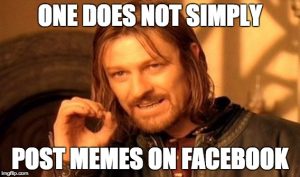Jan
13

Posted by nnlmneo on January 13th, 2017
Posted in: Blog
Welcome to our new NEO blogger, Kalyna Durbak. Her first post addresses a topic that is a concern to many of us, evaluating our social media!
By Kalyna Durbak, Program Assistant, NNLM Evaluation Office (NEO)
Have you ever wondered if your library’s Facebook page was worth the time and effort? I think about social media a lot, but then again I’ve been using Facebook daily for over 10 years. The book Measuring the Networked Nonprofit, by Beth Kanter and Katie Delahaye Paine, can help your library or organization figure out how to measure the impact of your social media campaigns have on the world.
Not all of us work for a nonprofit, but I feel many organizations share similar constraints with nonprofits – like not being able to afford to hire a firm to develop and manage the social media accounts. It’s easy to think that social media is easy to do because we all manage our personal profiles. Once you start managing accounts that belong to an organization, it gets hard. What do you post? What can you post? How many likes can I collect?

Before we get into any measurement, I want to briefly write about why social media outcomes are important to have, and why they should be measured. A library should not create a Facebook page simply to collect likes, or a Twitter page to gather followers. As my husband would say, that’s simply “scoring Internet points.” Internet points make you feel good inside, but do not impact the world around you. The real magic in using social media comes from creating a community around your organization that is willing to show up and help out when you ask.
A library should create a social media page in order for something to happen in the real world – an outcome. Figuring out why you need a social media account will help your library manage its various accounts more efficiently, and in the end measure the successes and failures of your social media campaigns. If you need more convincing, read Cindy’s post “Steering by Outcomes: Begin with the End in Mind.” For help on determining your outcomes, I suggest reading Karen’s blog post “Developing Program Outcomes using the Kirkpatrick Model – with Vampires.”
What are some reasons for using social media in your library? Maybe you will have an online campaign to promote digital assets, or perhaps you will add a social media component to a program that already exists in your library. Whatever they are, any social media activity you do should support an outcome. A few outcomes I can think of are:
None of the outcomes specifically mention Facebook, Twitter, or any other social media platforms. That’s because outcomes outline the big picture – it’s what you want to happen after completing your project. In the above examples, a library wants the donor base to be increased, or the library wants increased awareness of library programs. It’s the ideal world your library or organization wants to exist in. Facebook and Twitter can help achieve these outcomes, but the number of retweets you get is not an outcome.
To make that ideal future a reality, you need to create objectives. Objectives are the signposts that will indicate whether you are successful in reaching your outcome. Next week, we will craft social media oriented objectives for a library in our favorite hypothetical town of Sunnydale. Catch up on Sunnydale with these posts:
Let me know if you have any questions or comments about this post! Comment on Facebook and Twitter, or email me at kalyna@uw.edu.